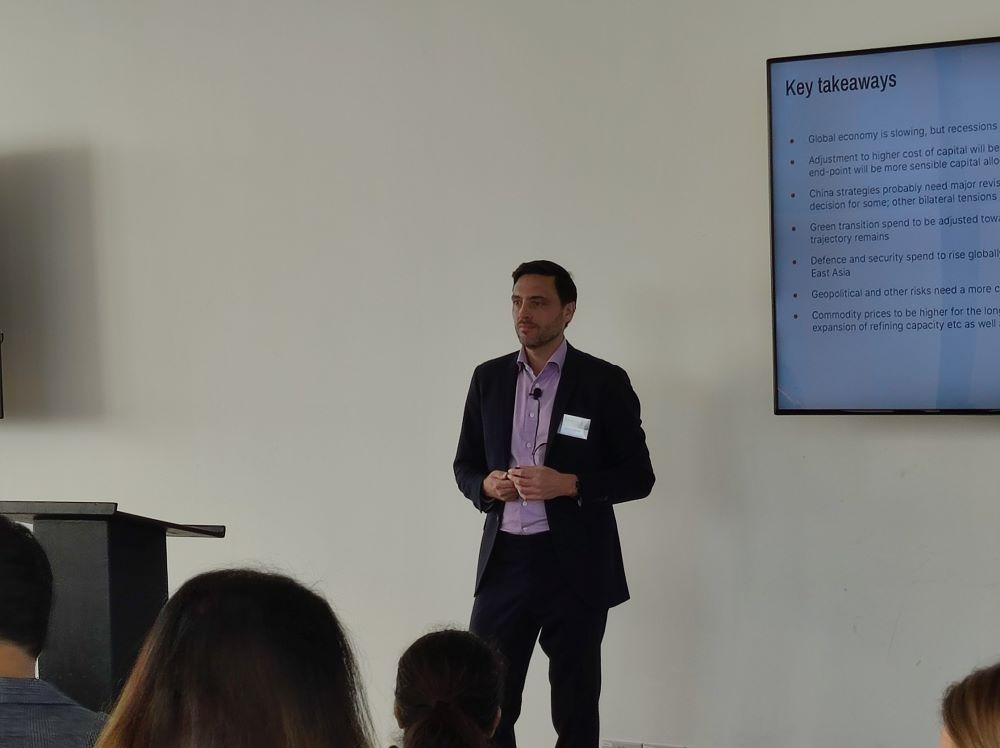
Economists at the Economist Intelligence Unit (EIU) and International Monetary Fund (IMF) have today warned that the global economy is set for slower growth over the next two years as a result of the war in Ukraine, the slowdown in China and high inflation.
Speaking at an EIU breakfast event at Tate Modern in London this morning (11 October), the EIU’s global chief economist Simon Baptist said that major economies will experience a “shallow but long” recession.
Slowing growth
He said that while the recessions in 2009 and 2020 led to an overall decline in global growth, that will not happen in 2022 or 2023.
The EIU is predicting only 2.7% global growth across the whole of 2022 however, followed by 1.9% growth in 2023. Baptist said that a normal year would see 4% growth.
No quick fix
Baptist said that the causes of the global economic slowdown require “medium term solutions” and that while inflation is likely to peak in the coming months before slowing down in 2023, the “era of zero interest rates forever is over”.
He said that challenges such as the energy crisis in Europe and the longer-term green energy transition cannot be addressed by short-term policy measures.
He added that European countries are likely to prioritise safeguarding their energy supplies, saying “no one wishes they had less renewables” right now.

[Simon Baptist warns of a long but shallow economic downturn at an EIU breakfast event in central London]
China impact
He also said that the downturn is more global in nature than previous recessions because it is being felt across all three major economies – the US, Europe and China.
The slowdown in Chinese growth in particular is having an impact with Baptist saying that the country had previously acted as the “saviour or at least the floor” during times of economic turbulence.
Although Baptist said China’s zero-Covid policy was “a mistake” that has taken 2% off Chinese growth this year, he also said that the longer-term picture was one of China “no longer being a high growth economy”.
The EIU is forecasting GDP growth below 3% for the country by the end of the decade and Baptist said that it was “plausible” that it may never see growth above 6% again.
New era
Baptist said we were now entering a new global economic era characterised by six major trends:
- Supply chains “getting shorter”
- An increased focus on commodity security, particularly following the war in Ukraine
- “A critical decade for the green energy transition” with the possibility of diverging policies
- The weaponisation of business amid rising US-China tensions – for example, the impact of US export controls on Chinese firms like Huawei
- The increasing politicisation of the tech sector at a global level
- The likelihood that interest rates have further to rise and will “not be going back to zero”
He did say, however, that despite the uncertainty in the global economy, there were opportunities for businesses.
He cited the localisation of supply chains as an example, saying that while “risk is higher up the agenda” nowadays, there was an opportunity for firms to enter new supplier networks, saying “maybe you can become the resilience for someone”.
IMF warning
Baptist’s warnings were confirmed by the IMF’s latest World Economic Outlook which was published today.
At a press briefing this afternoon, the director of research at the IMF, Pierre-Olivier Gourinchas, said the “global economy continues to face deep challenges shaped by three forces” – the impact of the war in Ukraine, the cost of living crisis caused by inflation and the slowdown in China.
The IMF predicts that global growth will slow to 3.2% in 2022, down from 6% in 2021. It also predicts that global inflation will rise from 4.7% in 2021 to 8.8% in 2022, before declining to 6.5% in 2023 and 4.1% in 2024.
“The worst is yet to come and for many people it will feel like a recession,” said Gourinchas.
UK slowdown
The IMF predicts that the UK economy will grow at a rate of 3.6% in 2022 – an upgrade of 0.4% on its forecast in July.
It predicts that growth will fall sharply to 0.3% in 2023 however, down 0.2% from its previous 0.5% estimate.


